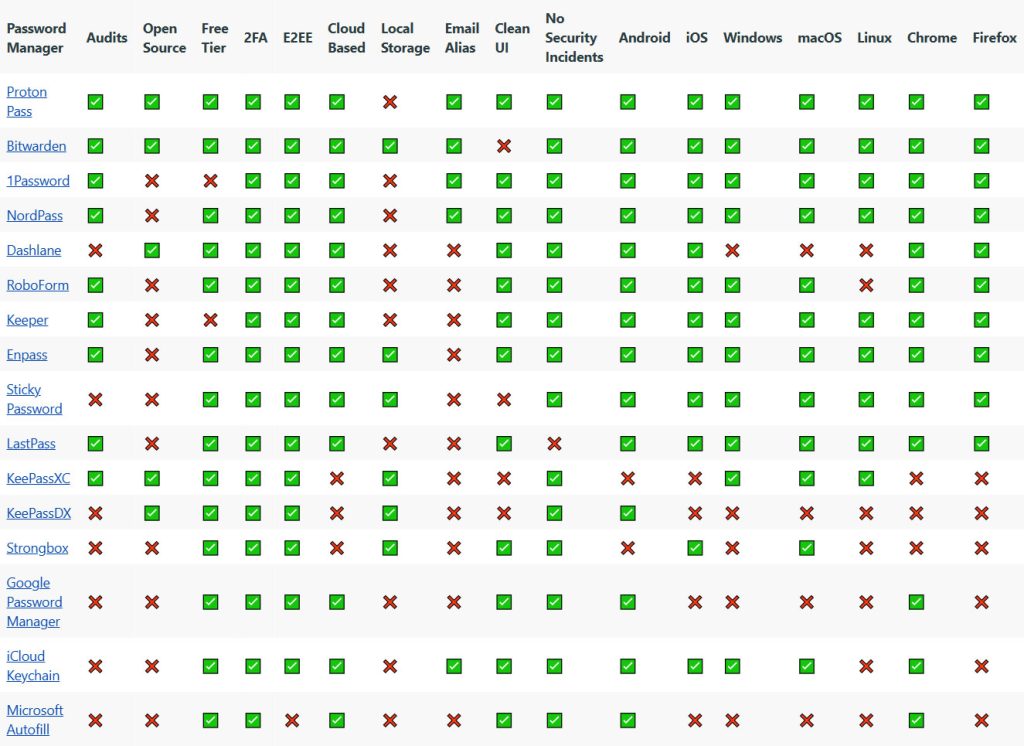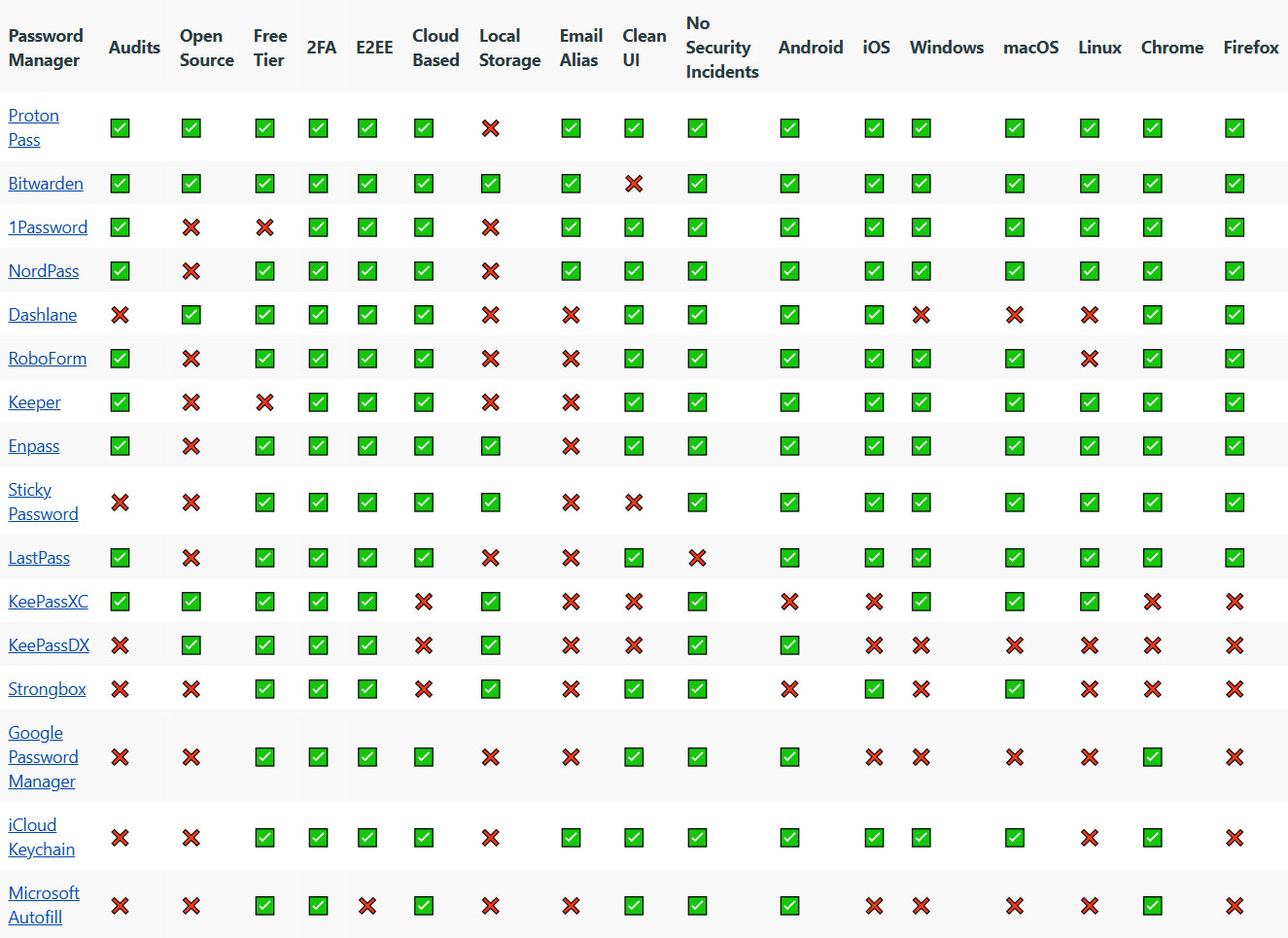In an era where cyberattacks are increasingly common—think of the 2023 LastPass breach that exposed encrypted user data—keeping your online accounts secure has never been more critical. With the average person juggling over 100 passwords, according to a 2024 NordPass study, password managers have become a go-to solution for safely storing and generating complex passwords. But with so many options out there, how do you pick the right one? A comprehensive comparison table shared on Reddit in 2025 breaks down the best password managers, highlighting their features, security, and usability to help users make an informed choice.
The list covers a range of password managers, from privacy-focused Proton Pass to the polished 1Password, and even free tools like Google Password Manager. Each option is evaluated on key factors: security audits, open-source status, availability of a free tier, two-factor authentication (2FA), end-to-end encryption (E2EE), platform support, and additional features like email alias integration or local storage. This comparison comes at a time when cybersecurity threats are surging—IBM’s 2024 Cost of a Data Breach Report notes that the average cost of a data breach reached $4.88 million last year, with stolen credentials being the top attack vector.
Proton Pass
Let’s start with Proton Pass, a standout for privacy-conscious users. Developed by the team behind ProtonMail and ProtonVPN, it’s open-source, independently audited, and uses end-to-end encryption, meaning only you can access your data—not even Proton can see it. It offers a clean interface, a solid free tier, and extras like email alias integration, which lets you create disposable email addresses for added privacy. However, it lacks local storage, so your data is stored in the cloud, which might not suit everyone. Proton Pass supports all major platforms, from Android to macOS, and works seamlessly with browsers like Chrome and Firefox.
Bitwarden
Bitwarden is another strong contender, especially for budget-conscious users. It’s also open-source and audited, with end-to-end encryption and a generous free tier. Unlike Proton Pass, Bitwarden offers the option for local storage, giving users more control over their data. It’s compatible with all major platforms and browsers, but its interface can feel a bit clunky compared to more polished options. A 2023 audit by cybersecurity firm Cure53 confirmed Bitwarden’s robust security, though it noted minor usability issues that the team has since addressed.
1Password
For those willing to pay for a premium experience, 1Password is a top pick. While it’s not open-source, it undergoes regular audits and boasts a sleek, user-friendly interface. It lacks a free tier—plans start at $2.99 per month—but its seamless integration across devices and browsers, like iOS and Chrome, makes it a favorite for many. 1Password also supports 2FA and end-to-end encryption, ensuring your data stays secure. A 2024 review in Wired praised 1Password for its “intuitive design and strong security features,” though it noted the lack of a free option as a drawback for some users.

(The author is uTech1000, Last updated: 4/17/2025.)
The comparison also includes other notable options. NordPass offers a free tier and a clean interface, with support for 2FA and end-to-end encryption, making it a solid all-around choice. Keeper, while lacking a free tier, excels in security with 2FA and a zero-knowledge policy, as highlighted in a 2023 Password Manager review. For those who prefer offline storage, Enpass and Bitwarden stand out with local storage options, reducing reliance on cloud servers—a feature that cybersecurity experts often recommend for added control, according to a 2024 article in The Verge.
Free tools like Google Password Manager and iCloud Keychain are also listed, but they come with trade-offs. While both offer 2FA and end-to-end encryption, neither is open-source, and they lack features like email alias integration. Google Password Manager, for instance, works well on Android and Chrome but isn’t available on Linux, limiting its versatility. A 2024 study by Security.org found that while these built-in tools are convenient, they often lack the advanced security features of standalone managers like Bitwarden or Proton Pass.
Dr. Sarah Mitchell, a cybersecurity expert at the University of California, Berkeley, emphasizes the importance of choosing a password manager with robust security features. “Look for end-to-end encryption, regular audits, and 2FA,” she advises. “Open-source options like Bitwarden or Proton Pass are great because their code is publicly reviewed, reducing the risk of hidden vulnerabilities.” She also warns against relying solely on free tools from tech giants, noting that their ecosystems can be prime targets for hackers.
So, what’s the best choice for you? If privacy is your top priority, Proton Pass is a strong contender with its open-source design and email alias feature. If you’re on a budget and want flexibility, Bitwarden’s free tier and local storage option might be the way to go. For a premium, user-friendly experience, 1Password is hard to beat, though it comes at a cost. Whichever you choose, the key is to start using a password manager—because in 2025, a strong password could be your best defense against a costly cyberattack. Take a few minutes to explore these options, set up 2FA, and make sure your digital life is as secure as your physical one.
Source of Material
This article is based on a comparison table of password managers shared on Reddit in 2025(The author is uTech1000). Additional insights were drawn from reviews in Wired (2024), Password Manager (2023), and The Verge (2024), as well as the IBM 2024 Cost of a Data Breach Report and a 2024 study by Security.org.

